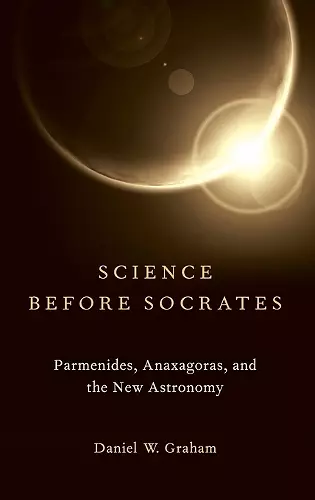Science before Socrates
Parmenides, Anaxagoras, and the New Astronomy
Format:Hardback
Publisher:Oxford University Press Inc
Published:1st Aug '13
Currently unavailable, and unfortunately no date known when it will be back

In Science before Socrates, Daniel Graham argues against the prevalent belief that the Presocratic philosophers did not produce any empirical science and that the first major Greek science, astronomy, did not develop until at least the time of Plato. Instead, Graham proposes that the advances made by Presocratic philosophers in the study of astronomy deserve to be considered as scientific contributions. Whereas philosophers of the sixth century BC treated astronomical phenomena as ephemeral events continuous with weather processes, those of the fifth century treated heavenly bodies as independent stony masses whirled in a cosmic vortex. Two historic events help to date and account for the change: a solar eclipse in 478 BC and a meteoroid that fell to earth around 466. Both events influenced Anaxagoras, who transformed insights from Parmenides into explanations of lunar and solar eclipses, meteors, and rainbows. Virtually all philosophers came to accept Anaxagoras' theory of lunar light and eclipses. Aristotle endorsed Anaxagoras' theory of eclipses as a paradigm of scientific explanation. Anaxagoras' theories launched a geometrical approach to astronomy and were accepted as foundational principles by all mathematical astronomers from Aristarchus to Ptolemy to Copernicus and Galileo-and to the present day.
Graham has written an intriguing book on a much neglected aspect of Presocratic thinking. * Journal of the History of Philosophy *
Graham has produced a fascinating and enjoyable challenge to the standard narrative of scientific progress. The passion of his commitment to rehabilitating Parmenides and Anaxagoras as successful scientists is clear throughout. * Jenny Bryan, Notre Dame Philosophical Reviews *
ISBN: 9780199959785
Dimensions: 150mm x 213mm x 31mm
Weight: 494g
304 pages